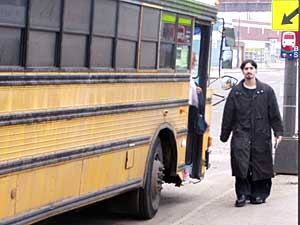|
Photos
Your Voice
|
Transit strike affecting students, teachers
March 26, 2004
Some metro area educators say the three-week-old transit strike has created an additional hardship for students. They say it has led to declines in attendance and decreases in participation in after school programs. The Met Council is expanding its efforts to help bus-dependent commuters get around. The Transit Grant Assistance Program is now available to schools that need help getting students to and from school.
St. Paul, Minn. — At 8 o'clock on a recent morning, students from the Jennings Experiential High School in St. Paul are stepping off a big yellow bus. The school's director, Jeff Holte, is there to greet them.
"Good morning, ladies," Holte says.
The transit union bus strike has caused major disruptions for Holte's students. School officials cancelled classes during the first week of the strike, because they were caught without a plan for how to get students to and from school.
 | |||
Holte says many of the 85 students live outside the range of the school's bus service -- and before the strike they depended on Metro Transit buses. Since the strike, attendance is down 10 percent to 20 percent. Holte says the school has had to spend money it wasn't prepared to spend. The school has hired two striking bus drivers to drive extra routes.
"We spend a lot of money on fuel, and then just the time that we spend," says Holte. "Not only do we have our two buses run with the striking bus drivers, (we) have people going out in our small vans -- our staff time -- to go out and pick up kids who live further out than our little bus routes can accomodate."
Holte says the strike has hindered the school's ability to carry out its core mission -- to teach students by getting them out of the classroom and into the real world. Before the strike, students used bus passes to go on field trips and to do research for other projects.
Even though Holte and other staffers have tried to pick up the slack by getting commercial bus driver's licenses themselves, they've still had to reduce the number of outside activities for students.
 | |||
Holte knows about the Transit Grant Assistance Program offered by the Met Council. He has also heard the program is not popular with the transit union and with some non-profit agencies. Holte has not applied for a grant, but he's considering it.
"We need the funds," Holte says. "We don't operate on a very big budget ourselves, so to have some relief to get through the strike would be really helpful."
Like the Jennings school, large public schools are spending more money on transportation and are seeing shrinking attendance since the strike. At Edison High School in northeast Minneapolis, the strike has affected staff members' ability to help homeless students get to school.
Marissa Courtney and her younger sister Angelina are two of the more than 3,000 Minneapolis Public School students who are homeless or transient. The girls and their mother have lived in shelters and at friends' houses over the last three years. Right now they are staying in Burnsville.
|
I'm involved in the newspaper, track. I did some of the talent shows, and some of them I was unable to do because of the strike.
- Marissa Courtney, Edison High School student |
Even before the strike, the girls had a long commute. However, the Metro Transit buses ran more frequently than the suburban metro buses they take now from downtown Minneapolis to Burnsville. Now Marissa can't do some of the after school activities she did before.
"I'm involved in the newspaper, track," says Marissa. "I did some of the talent shows, and some of them I was unable to do because of the strike."
Marissa, a 10th grader, says her grades have suffered because she used to be able to stay after school for tutoring sessions. Sometimes she would get to school early so she could talk with her teachers about assignments. Marissa says their mother wakes them up at 5:30 every morning. Three hours later, she and her sister, Angelina, arrive at school.
"It's worth it to me, because up here at Edison there's more things for us to do. And coming from our background of being homeless -- it's like they understand you more," says Angelina, who is in ninth grade.
Counselor Brenda Johnson says before the strike, the school was already running out of money to purchase tokens and bus passes for students like Marissa and Angelina. Johnson says as long as students like the Courtney sisters have a will to get to school, she'll find a way to get them there.
"I have a kid here who wants to be at Edison, and is making every effort to be here, because they feel supported here," says Johnson. "What are we going to do? Oftentimes I have to challenge the system to step up and we find a way."
Edison school officials have expressed interest in applying for state money to help them get transit-dependent students to school. So far, a few charter schools have applied for the TGAP funds from the state.
|
News Headlines
|
Related Subjects
|

